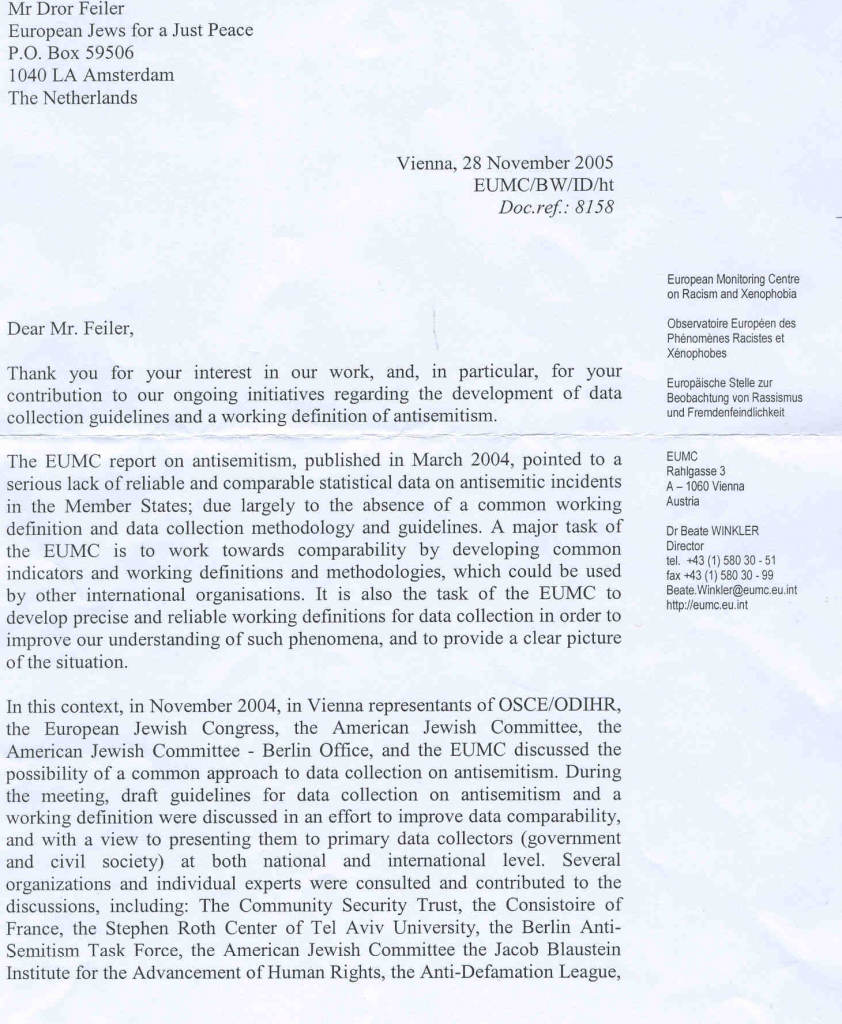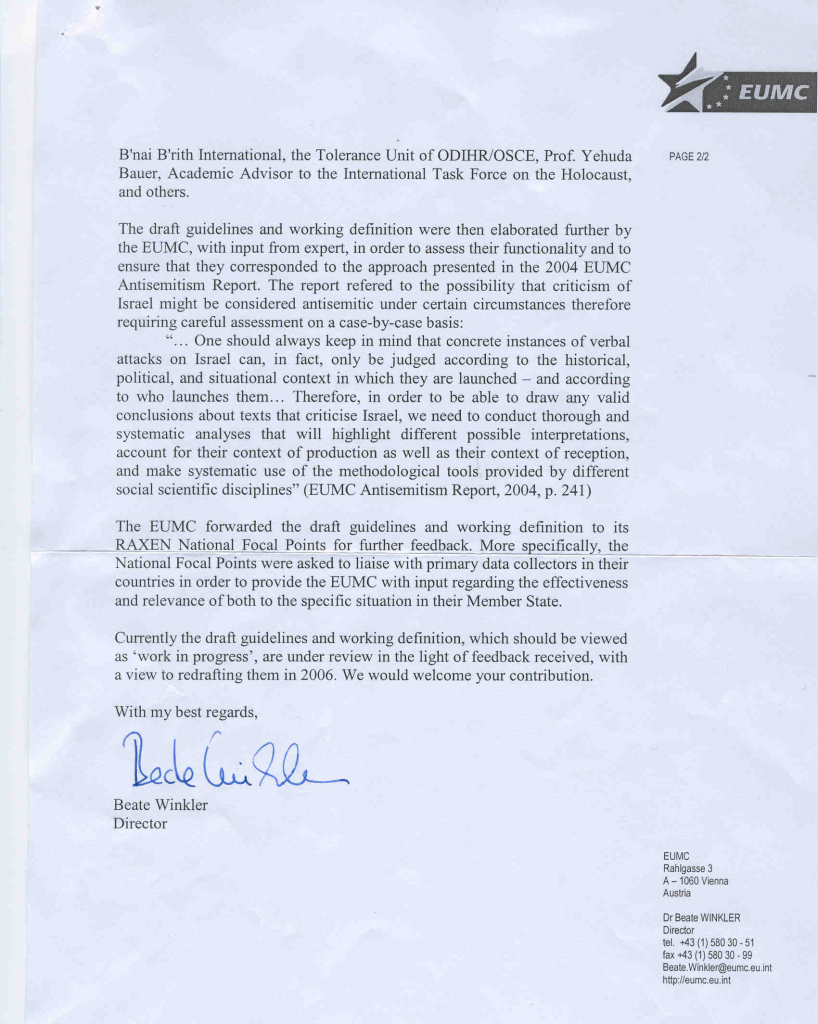October 13, 2005
At its conference in London in September 2005, European Jews for a Just Peace, a federation of Jewish peace organisation in ten European countries, noted that the EUMC had produced a highly problematic ‘Working Definition of Antisemitism’.
We have two comments, on process and on content:
On process
We are concerned about the process that gave rise to the Working Definition and we respectfully ask the EUMC to clarify and explain it. It is vital that the European public — especially those individuals and groups whose cooperation you seek — perceive the process to be transparent and above-board. Regrettably, this is not the case with your ‘Working Definition of Antisemitism’.
The document states that ‘Jewish organisations like the European Jewish Congress, the American Jewish Committee, other major Jewish NGO’s and prominent academics’ were consulted. We, however, though a federation of European Jewish organisations, were not consulted (though the American Jewish Congress was) and we know of other NGOs and prominent academics — including experts cited favourably in your March 2004 report ‘Manifestations of Antisemitism in the EU 2002-2003’ — who should have been consulted but were not. Nor is it clear how the ‘consultations’ (which presumably gave contrasting emphases to how they would see a working definition) were aggregated to produce the current Working Definition. This is especially problematic given that the Working Definition differs significantly in tone from the definition given in your 2004 report; in our view, the new version is unhelpful if not downright misleading (see below under ‘On content’).
In the interests of transparency, we would like to ask for some very specific information: which Jewish organisations were consulted; which other NGOs; which academics? Moreover, who exactly drafted the working definition in the light of these consultations?
Working definitions of antisemitism — and of Islamophobia and racism in general — are of universal concern (indeed, were they not, the EUMC would have no rationale for its work). We would stress therefore how important it is that they are not perceived as partisan and/or partial.
On content
Problems begin with the very ‘working definition’ provided. Of course antisemitism is ‘a certain perception of Jews’ – but what perception? Nowhere is this discussed, yet what perceptions are allowable, what unacceptable is surely key to any working definition of antisemitism? The earlier EUMC definition recognized that the ideological content of that perception is central to the usual meaning of the word ‘antisemitism’ and outlined that content. Leaving this out opens the door to confusion by failing to distinguish between different kinds – and sources – of hostility to Jews today. The definition contributes to the very problem it should be solving.
The problem is compounded by the list of ‘[c]ontemporary examples of antisemitism’, since they are all preceded by the rubric that they ‘could, taking into account the overall context’ be such examples. Equally, one supposes, they might not be. Yet the very inclusion of all of these as examples appears as prima facie evidence of antisemitism – otherwise why are they there?
This list is then followed by a separate list giving no fewer than five examples of how ‘antisemitism manifests itself with regard to the state of Israel taking into account the overall context’.
Some of the points in this second list are highly questionable and we must protest vigorously about them. For example:
- ‘Denying the Jewish people their right to self-determination’ assumes that all Jews equate self determination with Zionism. Not only is this not true today, it has never been true. There is a long and respected tradition in Jewish history and culture among all those who have wished or wish today for cultural, religious or other forms of autonomy falling short of a Jewish state; for a binational state in Palestine as did Martin Buber and others; or for a one-state solution today, whatever form it might take – a minority view in Israel today to be sure, but held by numbers of respected Jews. To make the assumption that all Jews hold the same views is in itself a form of antisemitism.
- ‘Applying double standards by requiring of it a behaviour not expected or demanded of any other democratic nation’. This is a formulation that allows any criticism of Israel to be dismissed on the grounds that it is not simultaneously applied to every other defaulting state at the same time. As campaigners for a just peace in the Middle East we can affirm that it is thrown willy-nilly to stifle any and all but the narrowest criticism of acts of the Israeli government that are in prima facie breach of clause after clause of the 4th Geneva Convention. Or again, the democratic norm that all citizens in a state should be treated equally sometimes sits uneasily with some notions of Israel as a ‘Jewish state’ and it is not antisemitic to point this out or to suggest that Israel should, indeed, be a ‘state of all its citizens’.
- ‘Holding Jews collectively responsible for actions of the state of Israel’. This is the flipside of a position, frequently expressed by Prime Minister Sharon and many Zionists, that refuses to make any distinction between the interests of Israel and those of Jews worldwide. Why it is permissible for them to make this elision but evidence of antisemitism when others do so is not clear. It might even be taken as evidence of double standards… In reality it is all too often Zionist rhetoric which fuses the notion of Israel’s interests with those of Jews worldwide and thus fuels what the EUMC identifies (other things being equal) as a potential indicator of antisemitism
This is not to deny that there are circumstances in which criticisms of the state of Israel might indeed be antisemitic. But the presumption should not be that they are. This requires demonstration on a case by case basis. As formulated this listing fosters a presumption that those who criticise the state of Israel in all kinds of legitimate ways are in fact covert antisemites. We number ourselves amongst such people and we vigorously reject the implication. that we are either antisemitic or ‘self-hating’ Jews in the strongest possible terms. In our experience, such accusations are used to stifle legitimate criticism and the EUMC formulation, by lending any credence to such views, does a disservice to the genuine struggle against antisemitism.
This document is a highly politicised one, reflecting a spilling over of Middle-East conflicts into Europe. All this might be merely academic were it not the very ‘purpose of this document’ is specified as being ‘to provide a practical guide for identifying incidents, collecting data, and supporting the implementation and enforcement of legislation dealing with antisemitism’. The working definition cannot bear this weight. Its effect, if unchallenged, will be to institutionalise theoretical confusions at the practical level.
Thus we, European Jews for a Just Peace, are not willing to accept the EUMC ‘Working Definition of Antisemitism’ as an adequate basis on which to proceed and call on the EUMC to reopen this question if its work is not to lose credibility among many of those who are committed to the fight against all forms of racism and xenophobia, including antisemitism.
Dror Feiler
Chair
EJJP
EUMC’s reply

